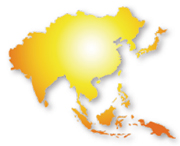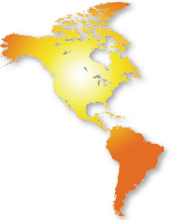Buyers from all over the world came to Secutech 2010 to look for solutions and find qualified suppliers. They found all the above and more.
Buyers from all over the world came to Secutech 2010 to look for solutions and find qualified suppliers. They found all the above and more.
This year's Secutech was affected by the Icelandic volcanic ash, which closed most regional airports and prevented buyers from making it to Taipei. Despite the natural disaster, Secutech attendance was the highest in its 13-year history, up 2 percent with 22,690 visitors.
Buyers found the show ideal for sourcing. "This year, I did not attend shows in Las Vegas, China, Hong Kong and so on. I only came to Secutech because all the innovative technologies are here," said Sergio Mendes, CEO of Sektronix. "It is difficult to manage information from other shows, but here, it is much more accessible, and the show is much more organized and professional."
The show's layout was easy to navigate. "The international buyers lounges and the business-matching area will definitely be adopted by other international shows in the world," said Saifuddin Bharmal, MD of Lookman.
Visitors can compare different vendors and products. "This is my first time, and the show is larger than I expected," said Silvio Muscat, IT Manage r for Red Handed Security. "I found out about the show through the Internet, and I wanted to get in touch with manufacturers directly, since I currently source Taiwanese products through a distributor."
Several visitors appreciated the product demonstrations. "I like to go to shows to see how the products perform in reality," said Richard Kiss, Director of Texolabs.
Gilad Epstein, VP of Product Management and Marketing for Lorex Technology, said, "The variety is great because there are many different vendors, so I can get a good feel of what is happening right now."
Secutech serves as a learning opportunity for many buyers. "I have been at all the conferences and seminars these two days, and Secutech conveys a progressive and innovative approach," said Joey Zalsos, MD of DriveNet Communication System.
The exhibition was a portal for international buyers to access Asian manufacturing. "Many Italians like to use Taiwanese products because they are of better quality for the price," said Stefano Brivio of BMS Impianti. Other buyers from Eastern Europe were also very interested in Taiwanese products.
Two overarching issues driving buyers to Secutech included political and social instability in many countries, which is encouraging security awareness. The other issue was the migration from analog to IP, spurred by the advantages of megapixel and HD.
Middle East and North Africa
AFRICA
Africa's economy is still recovering from the 2008 global crisis. "Every aspect of the economy is affected by the economic downturn — up to a 70 percent decrease in our economy," said Hajia Usman of Fammiah. "The security industry in Nigeria was down by 40 percent."
Since then, the local security industry have begun to rally. "There is an increase everywhere by 5 percent to 10 percent," said Lanre Obalisa, Director COO of Wave Length.
"Major Nigerian projects include airports and security for water pipe lines," Usman said.
The market is price-sensitive, making mid- to low-end products attractive. "We are looking at products produced all over Asia, from Malaysia to India to China," said Usman.
IRAN
Iran's security market grew, partly due to political instability. "The current security  market in Iran is worth US$200 million — a 200 percent rise from last year," said M. Sadeghe, Deputy MD for Andisheh Negar Pars. "The government issues instructions for all organizations in terms of what they should do to be secure."
market in Iran is worth US$200 million — a 200 percent rise from last year," said M. Sadeghe, Deputy MD for Andisheh Negar Pars. "The government issues instructions for all organizations in terms of what they should do to be secure."
The current trend is moving towards network systems for remote monitoring. "Newer projects prefer to install network cameras, and existing government projects are using network cameras in their expansions," said Mansour
Farzaneh, Director of Pooya Fara Negar. "Currently, the market is comprised of 60 percent analog and 40 percent IP."
ISRAEL
Security is a major market in Israel. "A lot of government funding goes into private companies to find and develop sophisticated systems and solutions," said Ami Paz, a security consultant from Israel. "Israel used to be a safe place five to 10 years ago, but now it has become more violent."
Israel has a thriving local industry for software and homeland security. "Our country is the size of New Jersey, but we have 7 million inhabitants and we are big on production," Paz said. Korean and Taiwanese products are widely deployed in Israel.
HD cameras are driving the migration to IP. "In Israel, 80 percent is still analog, since the integration of IP has slowed down in 2009," Paz said. "But it is picking back up and I believe megapixel and HD are driving it."
OMAN
Oman's security market is growing fast. "The market from two to three years ago has gone up at least 70 percent," said Mohamed Al Busaidi, Sales and Marketing Manager of IBN Amor Al Maamary Electronics.
"The countryside is relatively safe, but the city is expanding. A mix of people from all over the area are coming in, so we have been looking more into security and safety," said Abdullah Al Hinai, Project Manager of IBN Amor Al Maamary Electronics.
IP-based systems are projected to become more popular soon. "With the help of 3-G networks and WIMAX, IP sales will increase," Al Hinai said.
The biggest issue with the products is that it must be able to withstand high local temperatures. "It is 54 degrees Celsius in the shade right now, and this year it is going to get even hotter," Al Hinai said. "Some suppliers say they can go up to 80 degrees Celsius, but the cameras die in three to six months, and our warranty to our customers go for two to three years."
Quality control is a major concern. "We have a good supplier from Taiwan for the past four years, and we are here to look at what else is being offered," Al Busaidi said.
Southeast Asia
INDIA
Terrorist attacks in India have made security a top concern. "India has the maximum number of terrorist attacks these days, and we are focusing on homeland security," said Zaheer Ali, Director of Oriole India.
Vivek Bagri, founder of LiveDarshan, said, "The terrorists came in from the coastal areas, and the government has taken notice and are reinforcing those areas." Aside from the borders, public transportation, hospitality and national landmarks are being equipped with security.
"Things are picking up in certain areas, but there is still a lack of employment. People are thus more price conscious, resulting in fewer projects," said P.T. Manuel, MD of Tech Source.
Even so, people carry high hopes for the market and expect the economy to grow. "I project there will be a 10 to 25 percent increase in the economy this year in New  Delhi. Businesses and real estate are both doing very well," said M.R. Khan, CEO of M.R. Impex and Sons.
Delhi. Businesses and real estate are both doing very well," said M.R. Khan, CEO of M.R. Impex and Sons.
Most users rely on mid-range products for protection. "Chinese products cater to the mass customers who are price conscious," Bharmal said.
IP systems are the minority, due to risk and cost. "People are paranoid about network systems because they are afraid they can be hacked," Ali said.
Government projects are adopting network security. "High-end solutions for prestigious projects all prefer IP. Network cameras are able to give them enhanced video quality and better video analysis," said Sanjay Khatri, MD of Electronic Eye Systems.
INDONESIA
Indonesia is doing well economically. "Security is growing, especially because of a heightened awareness of terrorism," said Johan Haryanto, Director of Hotware Indonesia. "The government has allocated security funds for infrastructure protection, border control and ID protection."
Cities are the main users. "Smaller cities outside of Jakarta have not taken up security yet," said Michael Jip, MD for SMD. "The population is more than 200 million, but users for IP-based alarm systems will still take around three to five years to increase."
Analog dominates the market for now. "In another two years, IP-based systems will increase to 5 percent, with analog at 95 percent," Haryanto said.
The need to identify criminals is increasing demand for megapixel and HD. "But IP-based systems are not there yet because of bandwidth capabilities," said Wiwibowo Mangkuliono, Director of PT Mandiri Cipta Integrasi.
PAKISTAN
Pakistan has strong demand for security. Naveed Ebrahim, CEO of AGN, said, "There has been a 200 percent increase in the last six months, and there are new players coming in frequently."
Asian products fare well in the Pakistani market. "Products in Pakistan are mostly imported from Taiwan and China because they are easily accessible," he said.
PHILIPPINES
The presidential elections are taking place this month, which requires top security. "We are coordinating with the Philippines National Police to increase traffic control and surveillance," Zalsos said. Markets include city surveillance, financial institutions and ports.
Most users have small video installations. "A sample deployment would be two to four cameras, with a stand-alone DVR that costs roughly$500 to $700," said Gilbert Albero, President and CEO of 3GX Solutions.
Adoption is slow for IP-based systems. "One reason it is hard for the market to implement a high-end IT infrastructure backbone is the traditional installation and budget," Zalsos said.
Philipino environments require robust products. "The power supply in the Philippines is unstable, so products must have good electricity protectors, particularly for power-hungry cameras and DVRs," Albero said. "It is also hot and humid, so it is important to select equipment with extreme temperature protection."
THAILAND
Intensifying protests in Thailand have caused political unrest, affecting security players. "The tourism industry has plummeted," said Steve Harle, Deputy MD of ISS Security Services. Some international hotels have even closed.
People want to protect themselves and their assets. "Burglaries and theft continue to increase," said Vallop Kingchansilp, President of Thailand Chapter, Asian Professional Security Association.
VIETNAM
In Vietnam, security needs are increasing for surveillance. "There is too big of a gap between the rich and the poor so crime rates are high," said Leo Wu, Vice Director of Trung Loi.
Top verticals include homes and factories. "Residential buildings all use smart card-based access control systems for main lobbies and elevators," Wu said.
IP uptake is increasing. "The 3-G network started in 2009 and Wi-Fi is more popular in Vietnam than anywhere else," said Wu. "IP is still growing, even with the economic recession."
Currently, 80 percent of cameras are analog, while 20 percent are network cameras. "The prices for megapixel cameras are coming down, so they are becoming more widely used," said Duc Thang Nguyen, Director of Thacotek.
For government and military projects, Japanese and European products are preferred. "Private companies and residents use Taiwanese and Korean products, while small businesses use Chinese products," Nguyen said.
Latin America
BRAZIL
The 2016 Olympic Games drives the Brazilian security market. "The Brazilian market is quite closed, with only 20 to 30 companies licensed to import products," said Mendes.
Major verticals include airports, stadiums and entertainment venues, which are all in the project tendering process.
IP is expected to grow. "The price point right now is good to introduce IP-based systems into the market, particularly with all the Olympics hype," Mendes said. "But the IT infrastructure is not yet established. Users roughly get one mega-bit of bandwidth, compared to European users who get 10 mega-bits."
Price plays a factor in the Brazillian market. "In general, Korean prices are too high  and China is growing fast," Mendes said. "I am very impressed with China, it is learning fast."
and China is growing fast," Mendes said. "I am very impressed with China, it is learning fast."
GUATEMALA
TAS is a system integrator focused on efficiency. "This is our niche — we integrate energy management systems with other security systems," said Alvaro Luna, Technical Director of TAS. "People are interested in saving money and controlling their businesses."
Some popular verticals are shopping malls, residential apartments and commercial buildings. "Our clients are mostly people who want more business efficiency," Luna said.
Asia supplies 40 percent of Guatemalan products. "We have worked with Taiwanese manufacturers for two years now," he said.
MEXICO
Drug-related violence has wracked Mexico, driving security demand. Major verticals are commercial buildings, city surveillance and mobile security. "Customers such as DHL and Coca-Cola install cameras and DVRs in their vehicles, which generates ROI. "Trucks often go missing, and if retrieved, the installation pays for itself," said Shian White, Director of Latin America for
TrackJack.
IP equipment is gaining uptake, even though most systems remain analog. "There is a lot of foreign investment, and it is a great market for new technologies," White said. "Mexico has always been one step behind technologically, and local companies are now trying to get up-to-date on innovative products."
As a distributor, White said Asian manufacturers make up 80 percent of the market. "Ten percent come from Korea, 60 percent from China and 30 percent from Taiwan," he said. "US and European manufacturers are too expensive, so most people go for Chinese products. Israeli products are also widely accepted."
VENEZUELA
Venezuela is considered one of the more dangerous places in the world. "The country suffers from high crime rates," said Luis Coury, Director of Globosec Security Solutions.
Perimeters and guarding services are used, but electronic security is not as widespread. "People put up fences, wires, alarms, bollards and taut wires to protect property and homes," Coury said.
The market has grown substantially in the past five years. "New condominiums use more surveillance, and 20 percent of the population can afford high-tech and high-end products," Coury said. "They use everything from manned guards, to physical protection equipment, to electronic security equipment."
The Venezuelan market receives the majority of its imports from Asia. "60 to 70 percent of the products used in Venezuela are made in Asia — mostly from China and some from Taiwan," Coury said.